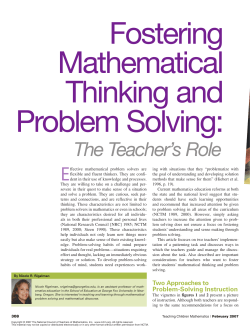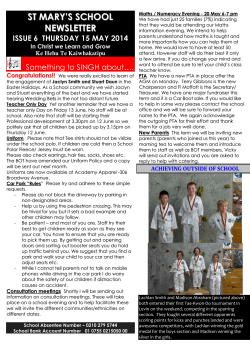
University of Glasgow Department of Mathematics Course 1R 2010-2011 Information for Students
University of Glasgow Department of Mathematics Course 1R 2010-2011 Information for Students Class Head Dr J.J.C. Nimmo (Mathematics Building, room 408, email: jonathan.nimmo@glasgow.ac.uk) About the Course Mathematics 1R is a Level-1 module, worth 20 credits, taught during the first semester. The pre-requisite for the course is a pass in Higher Mathematics or any equivalent qualification. The course is available to students in most faculties, but not normally to those in the Faculty of Engineering. The purpose of the course is to provide a semester course consolidating and leading on from the level of Higher Mathematics. The course is designed to cater for all students qualified to take it, whether or not they intend to specialise in mathematics. There is another first semester course Mathematics 1X, followed by 1Y in the second semester, open to students entering the university with very good mathematics qualifications. Student with grade A in Higher Mathematics plus at least grade B in Advanced Higher Mathematics, or grade A in A-level or other qualifications of a similar standard, should consider taking 1X rather than 1R. 1 1.1 How to get information Class website Go to the Moodle website http://fims.moodle.gla.ac.uk/ and log in using your Glasgow User ID (GUID) and password. On your first visit you will need to enrol in Mathematics Level-1 Moodle. Then navigate to Mathematics 1R. From this site you will be able to download copies of exercises and answers/solutions, lecture notes, past exam papers, any handouts you might have missed and view other useful information. 1.2 Class noticeboard This is outside lecture room 214, near to the main entrance in the Mathematics and Statistics Building. Details of assignment of students to sections and (later) tutorial groups together with dates of exams etc. will be posted here. Students should also consult the class website (see §1.1.) 1.3 Enquiries Enquiries about the organisation of the class should be made initially at the General Office on Level 1 in the Mathematics and Statistics Building. Enquiries about the work of the class should be directed to one of your lecturers. Contact details and office numbers for all lecturers are given on the weekly schedules at the end of this document. 1 2 2.1 Organisation and work of the class Sections The class runs in four sections at three different times 10 a.m. (1R1), 11 a.m. (1R2 and 1R3) and 4 p.m. (1R4). Depending on the times of your other classes, you will be assigned to one of these sections. You will attend the same section every day, from Monday to Friday. The assignment to sections will be posted on Moodle over the weekend (18th, 19th September) and the Class noticeboard (see §1.2) before the first lecture on Monday 20th September. Over the first week or so, late timetable changes may mean that you are in a section at a time which clashes with another commitment. If it is essential that you attend at a different time, go to the Mathematics General Office to fill in a form requesting a change to another section. This will be processed within 24h h ours and you will receive an email notifying you of the outcome. 2.2 Weekly schedule Sometimes we refer to the weeks of the year by number. Enrolment takes place in Week 0, the first week of teaching in the first semester is Week 1. A weekly schedule for each section of the class is shown at the end of this document and this gives these week numbers as well as the date of the Monday of each week. 2.3 Lectures In a normal week, there will be four lectures, two on Algebra and two on Calculus, given by different lecturers. These lectures cover all the mathematics in the syllabus and include many worked examples. You should take your own notes at these lectures and consult these when working on exercises, either at tutorials or in your own time, and when revising for examinations. Typed lecture notes are also available for download on the class website (see §1.1). The first lecture in on Monday 20th September. It is a requirement for credits that students attend lectures (see §4.5) 2.4 Exercises and homework All exercises for the course are contained in a document that will be handed out at the first lecture. Several of these exercises will be assigned as homework each week. At the first lecture you will also be given a sheet containing details of the homework assignments for the whole course. This homework should be handed in at the end of the lecture on the following Monday (or as directed). It will be corrected and returned to you at the next tutorial. It is a requirement for credits that students hand in homework (see §4.5) In addition to the homework exercises, the handout also gives details of additional exercises to be completed either at your tutorial or in your own personal study each week. 2.5 Tutorial arrangements Tutorials take place in groups of 15 or so students, with one staff or postgraduate student tutor. The homework you hand in will be corrected by the tutor and returned to you at the tutorial. Tutors will deal with any issues arising from the homework problems, and will lead the group through tackling some of the additional weekly exercises. 2 It is a requirement for credits that students attend tutorials (see §4.5). 2.6 Workshops The latter part of the tutorials taking place in Weeks 3, 5, 7 and 10 will be set aside for students to tackle workshop questions. These are mini tests covering the work of the class in the previous two weeks and the four of them contribute a total of 20% to the overall assessment for the course (see §4.4). Sample questions will be handed out on the Fridays of preceding weeks to allow students to prepare to tackle these questions. It is a requirement for credits that students attempt workshop questions (see §4.5). It is not possible to resit workshop tests. If you absent from a test through illness or a similar reason, you must be sure to report this (see §5.1) to ensure you are fairly assessed. 2.7 Skills labs All Level-1 mathematics students are required to participate in computer based skills tests. Five labs will be scheduled for each student but once the test is passed you need not attend the remaining sessions. These labs are organised by Dr Stuart White (stuart.white@glasgow.ac.uk). More information is given in the handout “Skills Labs”. 2.8 Personal study Mathematics 1R is one third of the curriculum of a first year student during the first semester. It is expected that students spend 5–7 hours (or more, if necessary) per week on mathematics in addition to attending lectures and tutorials. This time can be spent on reading lecture notes and textbooks, tackling the weekly homework problems and additional exercises and getting help with aspects of the lecture notes they do not understand or with exercises they cannot do. We offer a variety of ways to get help and these are described in §3 2.9 Textbooks No purchase is essential but students may wish to consider buying one of the following texts. • Robert A. Adams and Christopher Essex Single Variable Calculus (Pearson Custom Publication) This is a custom text containing all of the Calculus needed in Mathematics 1R and in Mathematics 1S, its second semester continuation. It does not cover the Algebra part of either course and is not a recommended text for Mathematics 1T in the second semester. The price of the book also gives access to online resources, such as additional step-by-step exercises, at MyMathLab. Only available through university bookshop. • C.M. McGregor, J.J.C. Nimmo, W.W. Stothers Fundamentals of University Mathematics (3rd Edition) (Woodhead Publishing) This text covers all of the material Mathematics 1R and 1S, Calculus and Algebra, in a slightly more theoretical way in than the present course. 3 • D.J. Moore Calculus: A First Course (3rd Edition) (Moodiesburn Press) This text covers the Calculus parts of Mathematics 1R and 1T. It is a compulsory purchase for 1T. • Robert A. Adams and Christopher Essex Calculus: A Complete Course (7th Edition) (Pearson) This is the complete text, of which the custom text is approximately half, containing all of the Calculus needed in Levels-1 and 2 Mathematics courses. Although it covers the material in the Level-2 Calculus courses, it is not at present a recommended text for these. Students already committed to taking Mathematics at Level-2 might consider purchasing this book. 3 Study support If you need help understanding topics covered in lectures or tutorials you should, in the first instance, discuss the problem with one of your lecturers or your tutor. Students who wish to seek extra assistance are welcome to call (either individually or in small groups) on one of their lecturers at his/her office. Lecturers will tell you the “Open Office Hours” when they will be available for this purpose and this information is also posted on their office doors. You may also arrange an appointment by email. Contact details and office numbers for all lecturers are given on the weekly schedules at the end of this document. Additional help in the form of individual advice and tutoring is also available through the Learning and Teaching Centre’s NUMBER unit. This is coordinated by Mrs Shazia Ahmed (shazia.ahmed@glasgow.ac.uk). You may also seek help by joining a PAL (Peer Assisted Learning) group facilitated by an undergraduate student later on in their studies. This programme is coordinated by Dr Lorna Love (lorna.love@glasgow.ac.uk). Both Shazia and Lorna will come to the first skills lab sessions to describe what they have to offer. 4 Assessment and Award of Credits 4.1 Workshops These are mini-tests in Weeks 3, 5, 7 and 10 contributing 20% to the overall assessment (see §2.6 for more details). 4.2 Class Test There will be one Class Test lasting 50 minutes, held in Week 9. This contributes 20% to the overall assessment. All questions should be completed to obtain full marks. It is not possible to resit this examination. 4.3 Degree Examination This will be held in Week 12 or 13. It will consist of one 2 hour long paper and contributes 60% to the overall assessment. All questions should be completed to obtain full marks. There is a resit examination in August. 4.4 Summary of assessment 1. Workshops: 20%, 2. Class Test: 20%, 4 3. Degree Examination: 60%. It is possible to resit the Degree Examination but it is not possible to resit the Class Test or any of the Workshops. If you miss any workshops or the class test because of illness or other valid reason, the basis for overall assessment will be adjusted accordingly. See §5.1 for details of how to report absences. 4.5 Minimum Requirement for the Award of Credits To be awarded the credits for Mathematics 1R, a student must: (a) be present at lectures on at least 50% of the occasions on which attendance is checked; (b) attend at least 70% of tutorials; (c) hand in homework on at least 70% of the occasions when such work is set; (d) attempt each set of Workshop questions; (e) attend at least 4 out of the 5 scheduled skills labs. (Once you have passed the skills test, this requirement is waived and you no longer need to attend any remaining skills lab sessions.) (f) sit the Degree Exam in December. Notes • Of course, if you have a valid reason (e.g. illness) for missing part of the assessment or failing to meet the minimum requirements for credits, this will be taken into account. See §5.1 for instructions on how to report absences. In particular, under University Regulations, students who are absent without valid reason from the Degree Examination in December may be permanently refused credits for the course. In these circumstances especially, it is very important that you give proper notice of this (see §5.1.) In order to obtain the credits, such students will need then to sit the Degree Exam in August. • Students should aim for full attendance and to hand in all homework, rather than the minimum requirements specified above. 4.6 Grades Every student who has satisfied the minimum requirement specified above will be awarded a grade from A to H. Normally, the ‘pass’ borderline between D and E is set somewhere between 40% and 45%. The precise borderlines between all grades are decided by the Board of Examiners. Notes • poorer than grade D is insufficient to ensure progress to Level-2 Mathematics; • resit results will not normally give more than the equivalent of a grade D. 5 5 5.1 Miscellaneous items Absences If you are absent for more than 7 days, or if you have valid reasons for missing any part of the assessment (see §4.4) or failing to meet the minimum requirements for credits (see §4.5), you need to record this fact via WebSURF (http://www.websurf.gla.ac.uk/). For more information on this topic, visit http://senate.gla.ac.uk/academic/policies/ and follow the link to “Absence policy (students)”. 5.2 Staff-Student Committee The department has a Staff-Student Committee with student representative from all levels. An invitations for nominations for a 1R class representative will be given in the next few weeks. You can contact the Staff-Student Committee through your class representative (or through any other member of the Committee whether staff or student). For information about staff members and student representatives, see the class website (see §1.1) or noticeboard (see §1.2). 5.3 Use of calculators in examinations Any sufficiently simple calculator may be used in examinations. Each examination paper bears the following rubric, which is strictly enforced: An electronic calculator may be used provided that it does not have a facility for either textual storage or display or for graphical display. 5.4 Prizes It is customary to award prizes and bursaries to students who perform best in the overall assessment in Level-1 (1R+1S, 1R+1T or 1X+1Y). Around fifteen awards, worth between £50 and £200 each, are made every year. 6 Progress to other mathematics courses After taking 1R, students may choose to take Mathematics 1S or 1T in the second semester. Students do not need to achieve a pass (grade D or better) in 1R in order to take 1S or 1T. A pass in the Skills Test is a pre-requisite for entry to all Level-2 Mathematics courses. Achieving grade D or better in both 1R and 1S or 1R and 1T (or 1X and 1Y) will contribute to the entitlement of a student to take Level-2 Mathematics courses. 6 Lecture room: Maths 325 Lecture room: Graham Kerr LT1 1 2 3 4 5 6 7 8 9 10 11 21/9 28/9 5/10 12/10 19/10 26/10 2/11 9/11 16/11 23/11 30/11 Monday L L L L L L L L TEST L L Tuesday L L L L L L L L L L L Wednesday L T W T W T W T L W L Thursday L L L L L L L L L L R Friday L L L L L L L L L L R Key: L=lecture, T=tutorial, W=Workshop tutorial, TEST=Class Test, R=Revision lecture Homework: Announced at the Thursday lecture and handed in each Monday. Calculus lecturer: Prof. S. J. Pride (office - 431, email - s.pride@maths.gla.ac.uk) Week starting EX EX 13 14/12 AM S 13 14/12 AM S 12 7/12 Tutorial rooms: Various, to be announced Weekly schedule for Mathematics 1R2 Algebra lecturer: Dr T. Brendle (office - 526, email - t.brendle@maths.gla.ac.uk) Time: 11 a.m. Week starting 1 2 3 4 5 6 7 8 9 10 11 21/9 28/9 5/10 12/10 19/10 26/10 2/11 9/11 16/11 23/11 30/11 Monday L L L L L L L L TEST L L Tuesday L L L L L L L L L L L Wednesday L T W T W T W T L W L Thursday L L L L L L L L L L R Friday L L L L L L L L L L R Key: L=lecture, T=tutorial, W=Workshop tutorial, TEST=Class Test, R=Revision lecture Homework: Announced at the Thursday lecture and handed in each Monday. Calculus lecturer: Dr J. J. C. Nimmo (office - 408, email - j.nimmo@maths.gla.ac.uk) 12 7/12 Tutorial rooms: Various, to be announced Algebra lecturer: Dr C. Athorne (office - 406, email - c.athorne@maths.gla.ac.uk) Time: 10 a.m. Weekly schedule for Mathematics 1R1 Lecture room: Maths 515 1 2 3 4 5 6 7 8 9 10 11 21/9 28/9 5/10 12/10 19/10 26/10 2/11 9/11 16/11 23/11 30/11 Monday L L L L L L L L TEST L L Tuesday L L L L L L L L L L L Wednesday L L L L L L L L L L L Thursday L T W T W T W T L W R Friday L L L L L L L L L L R Key: L=lecture, T=tutorial, W=Workshop tutorial, TEST=Class Test, R=Revision lecture Homework: Announced at the Friday lecture and handed in each Tuesday. Calculus lecturer: Dr I. S. Murphy (office - 430, email - i.murphy@maths.gla.ac.uk) Week starting EX EX 13 14/12 AM S 13 14/12 AM S 12 7/12 Tutorial rooms: Various, to be announced Weekly schedule for Mathematics 1R4 Algebra lecturer: Dr D. Stevenson (office - 434, email - d.stevenson@maths.gla.ac.uk) Time: 4 p.m. Week starting 1 2 3 4 5 6 7 8 9 10 11 21/9 28/9 5/10 12/10 19/10 26/10 2/11 9/11 16/11 23/11 30/11 Monday L L L L L L L L TEST L L Tuesday L L L L L L L L L L L Wednesday L L L L L L L L L L L Thursday L T W T W T W T L W R Friday L L L L L L L L L L R Key: L=lecture, T=tutorial, W=Workshop tutorial, TEST=Class Test, R=Revision lecture Homework: Announced at the Friday lecture and handed in each Tuesday. Calculus lecturer: Dr R. Simitev (office - 408, email - r.simitev@maths.gla.ac.uk) Algebra lecturer: Dr R. J. Steiner (office - 513, email - r.steiner@maths.gla.ac.uk) 12 7/12 Lecture rooms: Maths 204 (Monday); Maths 326 (Tuesday, Wednesday); Boyd Orr LT D (Thursday, Friday) Tutorial rooms: Various, to be announced Time: 11 a.m. Weekly schedule for Mathematics 1R3
© Copyright 2025














